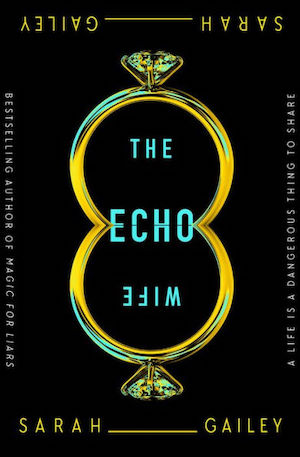I’m embarrassed, still, by how long it took me to notice...
We’re thrilled to share an excerpt from Sarah Gailey’s The Echo Wife, a domestic thriller with a science fiction twist—available now from Tor Books.
I’m embarrassed, still, by how long it took me to notice. Everything was right there in the open, right there in front of me, but it still took me so long to see the person I had married.
It took me so long to hate him.
Martine is a genetically cloned replica made from Evelyn Caldwell’s award-winning research. She’s patient and gentle and obedient. She’s everything Evelyn swore she’d never be.
And she’s having an affair with Evelyn’s husband.
Now, the cheating bastard is dead, and both Caldwell wives have a mess to clean up.
Good thing Evelyn Caldwell is used to getting her hands dirty.
Chapter Four
Late in the afternoon, Seyed sat on a lab stool next to me and eased my pencil out of my hand. “Hey, Evelyn?” He ducked his head and looked at me with his wide, patient brown eyes.
“Yeah?”
“You’re driving me fucking crazy.” He drummed the pencil on the side of my clipboard in a staccato rhythm. It was loud, uneven, and deeply irritating. He twisted in his chair, looked at the lab phone, looked back at the clipboard, tapped it with the pencil again. “You’ve been doing this shit all day,” he said. “Call Martine already.”
A flush of shame. Fidgeting. “You’re right. I don’t know why I’ve been—ugh. I’ll do it soon, okay?” I almost apologized, but I stopped myself just in time. It was one of my rules, a rule that my father branded into me when I was a child. It was a rule that had gotten me through grad school and internships and the end.less fight for respect and recognition. Never apologize in the lab. Never apologize in the workplace.
Never apologize.
“C’mon, boss.” Seyed gave me an encouraging smile. It stung like cautery. “You’re Evelyn Goddamn Caldwell. You just won a Neufmann Honor. This lady’s got nothing on you.”
I grimaced, but nodded. Seyed calling me “boss,” the sign of a serious pep-talk attempt.
He was doing his best.
He couldn’t help what he didn’t know.
***
I’ve never been an optimist.
I’ve never had cause to expect a positive outcome when all the signs point to a negative one.
Except once.
Buy the Book


The Echo Wife
I bowed to optimism one time, and it was a mistake.
I had been at the museum, enduring an ill-advised attempt at connecting with Lorna’s other research assistant. He was a man who rode his bicycle to the lab every day and ate raw vegetables for lunch. He was tall, stringy, an array of tendons loosely hung on a wire framework. He seemed like a good way for me to practice networking, if not actual friendship. I can’t even remember his name now—Chris, probably, or Ben.
Nathan had found me while I was waiting for my colleague to return from an eternal trip to the lavatory. He sidled up to me at a display of collider schematics. He had long hair then, past his shirt collar, and wore it tied back into a low ponytail. I remember noticing the ponytail and rolling my eyes before he even spoke to me. Later, just before our wedding, he cut it off, and I cried myself to sleep missing it.
“You don’t look like you’re having fun on your date.” That was the first thing he said, his voice pitched low enough that I didn’t immediately recognize that he was talking to me. When I glanced over, Nathan was looking at me sidelong, his mouth crooked up into a dimpled half-smile.
“It’s not a date,” I snapped. “We just work together.”
“He seems to think that it’s a date,” he’d said. “Poor guy’s under the impression that you think it’s a date too. He keeps trying to grab your hand.” I looked at him with alarm, and he held up his hands, took a step away from me. “I haven’t been watching you or following you or anything, we’ve just—we’ve been in the same exhibits a couple of times, and I noticed. Sorry.”
He started to walk away, hands in his pockets, but I stopped him. “It’s not a date,” I said, not bothering to keep my voice down. “He knows it’s not a date. We’re just colleagues.” My non-date came out of the bathroom then, looked around, spotted me. He started to cross the gallery, and I panicked. “In fact,” I said, “you should give me your phone number. Right now.” He grinned and took my phone, sent himself a message from it. Hi, it’s Nathan, rescuing you from an awkward situation.
By the time he’d finished, my colleague had reached us. I gave Nathan a wink, trying to come across as flirtatious, as bold. He would later tell me that I’d looked panicked.
“Give me a call,” he’d said, glancing between me and poor Chris, or Ben, or whatever his name was.
I’d gotten what I needed—a way to make sure my colleague knew that the thing he had hoped for was never going to happen. I told him brightly about getting asked out, said something about how we should do coworker outings more often. I pretended not to notice the way his face fell.
I never had any intention of calling Nathan.
But I did call him. I didn’t have a good reason to, didn’t have any data to support the decision. I took a chance on him.
I had hoped for the best.
***
Martine answered the phone on the second ring. Her voice was high, light, warm. Nonthreatening. Hearing it was like swallowing a cheekful of venom.
“Hello, this is the Caldwell residence, Martine speaking.”
I forced myself to look past the fact that she’d used Nathan’s last name, as if it belonged to her. As if she were a Caldwell. As if she got to have a name at all. I unconsciously slipped into the low, brusque tone I used when speaking at conferences. “It’s Evelyn. My lab assistant gave me your message.” I didn’t ask any questions, didn’t let any uncertainty through. Authoritative. Unapologetic. Don’t fidget. Don’t apologize.
She was more than polite. Excited, even. She sounded like she was talking to an old friend, instead of to the woman whose husband she’d stolen. That’s not fair, I mentally chastised myself. It’s not her fault. I told her that I couldn’t talk long, tried to sound like there was a reason I had to go, instead of like I was running away.
“Oh, before I forget—I understand congratulations are in order,” Martine said, her voice easy. I couldn’t help admiring the way she navigated conversation, the infinite finesse of it. She was showing me mercy: by interrupting, she kept me from having to commit the rudeness of admitting I didn’t want to stay on the phone. The faux pas of her interruption rescued me from feeling awkward. It absorbed discomfort on my behalf. The ultimate mannerly posture.
I recognized the maneuver. It was directly out of my mother’s playbook.
Martine asked me if I would consider getting a cup of tea with her. I paused long enough that she asked if I was still on the line. “Yes. I’m here.” I cleared my throat. “Why do you want to get tea with me, Martine?”
Martine laughed, a light, tinkling laugh, one designed to make people feel fun at parties. That was also my mother’s. “Oh, I’m so sorry if I’ve worried you at all, Evelyn. I just wanted to get tea so we could get to know each other a little. I know that things with Nathan aren’t ideal, but I don’t want there to be any troubled water between us. Don’t you think it would be better if we could be friends?”
I choked back a laugh. “Friends?”
“I would love to get to know you,” Martine said, as though this were a perfectly reasonable request. I was the woman who had been married to Nathan, the woman whose life Martine’s existence had blown to pieces, and she wanted to get to know me. Of course she did. Why wouldn’t she?
She asked again, and this time, a note of pleading entered her voice. “Just tea. An hour. That’s all. Please?”
I didn’t ask for his opinion, but of course Seyed told me not to do it.
“I have to. I said I would.”
“Don’t get coffee with this lady, it’s weird. You know this is weird, right?”
You have no idea how weird this is, I thought. “She asked me to get tea, not coffee. And I have to go.”
Seyed looked up from the felt he was gluing to a clipboard. “Why do you owe her anything? It’s not like you’re the homewrecker here.”
“She’s—it’s complicated, Sy. And besides, I already said I’d go.”
“When are you doing this objectively insane thing?”
“Tomorrow morning. So I’ll need you to handle the fluid sampling.”
He raised an eyebrow. “You mean I’m covering your workload while you do the thing you know you shouldn’t do.”
“Yes,” I said. “Please.”
“Great.” He walked the clipboard back to the tank it belonged to, returned it, and grabbed an un-felted clipboard from the next tank over. “Perfect. Because I didn’t have enough to do.”
He was irritated with me, and rightly so. I debated telling him everything—telling him why I couldn’t say no to Martine, what I owed to her, why I needed to see her. But it was too much already, him knowing who Martine was. Him knowing Nathan had been unfaithful.
The idea of telling Seyed who Martine really was caused my entire mind to recoil. “I’ll be in by ten,” I said.
“Have you ever seen this woman in person before?” he asked. “What if she’s, like, a murderer?”
I grimaced at the memory of my knuckles on the red-painted front door of Nathan’s second, secret house. The knob turning. Martine’s face, smiling out at me, eyes blank and polite in the few seconds before recognition struck us both. “I’ve seen her before,” I said. “She’s very sane.”
Seyed shook his head, cutting a strip of felt. “I still don’t think you should do this to yourself,” he said softly. “Not that my opinion matters.”
That last part wasn’t a barb—it was an apology. He knew he was intruding, knew he was speaking out of turn. And he also knew that his opinion did matter, mattered when no one else’s did. He was allowed to question me. He was allowed to offer opinions. He was allowed to speak during oversight meetings, even when my funding was at risk, even when the meeting was really a battle for survival.
I respected Seyed. He could keep up with me. He was one of the only people who was allowed to have an opinion at all.
“I know I shouldn’t do it, Sy,” I replied, watching him apply glue to the back of the clipboard. “But I’m going to anyway.”
I couldn’t turn my back on Martine.
I couldn’t escape her, any more than I could escape myself.
Excerpted from The Echo Wife, copyright © 2021 by Sarah Gailey.










